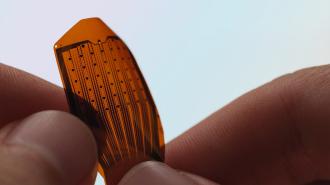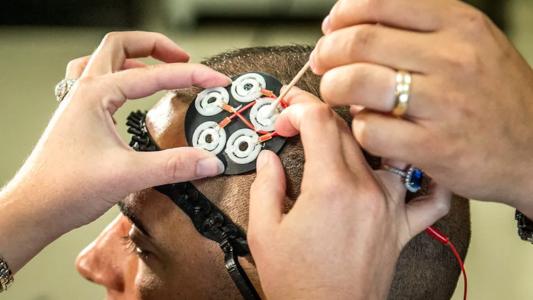A startup founded by a former Neuralink exec is developing a safer, easier-to-place brain implant — and it just tested the device in people for the first time.
Brain implants: Almost everything you think and do comes down to tiny pulses of electricity zipping between the 120 billion neurons in your brain. Brain implants give us a way to see this activity with far more precision than any device outside of the skull, like an EEG or MRI.
By pairing this brain implant data with advanced computer algorithms, researchers have created brain-computer interfaces (BCI) that can translate thoughts into text on computer screens, commands for robotic limbs, and more.
The challenge: Today, BCIs are almost solely used in very small studies to help people overcome severe health problems, such as epilepsy or paralysis. In the future, though, the systems could potentially give anyone who wants it the ability to connect their brain to robots or other technology.
But to get there, we will need better brain implants.
The most commonly used type of brain implant, a “Utah array,” looks like a miniature bed of tiny nails, with 100 conductive electrodes protruding from a base of hard silicon. To implant it, a surgeon removes part of a patient’s skull and then sticks the electrodes into their brain tissue.
This surgery is highly invasive, and having electrodes pierce the brain causes inflammation and scarring, which over time makes the implant less effective. To replace an implant, a patient would need to undergo another invasive procedure and have a different part of their brain pierced.
The surgery risk and brain scarring is enough to deter many people from getting BCIs, even if the devices could do something amazing like stop depression or restore their ability to walk. Unless something changes, we almost certainly aren’t going to see BCIs adopted by the general public.
The idea: Several groups are now developing what they hope will be less invasive brain implants, including Precision Neuroscience, a startup co-founded by Benjamin Rapoport, who was a founding member of Elon Musk’s BCI company, Neuralink.
“It’s as if I was seeing the patient’s brain think.”
Peter Konrad
Precision’s implant, the Layer 7 Cortical Interface, looks more like a piece of tape than a bed of nails. The base is made of a flexible film, one-fifth the thickness of a human hair. In an area of just 1 square centimeter, Precision has embedded 1,024 tiny electrodes — more than 10 times as many as the standard Utah array.
To place the device, a surgeon can make an incision less than a millimeter wide and then slide the implant into the space between their brain and skull. The brain implant then conforms to the brain tissue without piercing it. Removal can, ideally, be made through an incision just as small.
What’s new? On June 6, Precision announced that it had officially launched an in-human study of its brain implant, testing the system in three patients at West Virginia University’s Rockefeller Neuroscience Institute (WVU RNI).
All three study participants had the implant just temporarily placed on their brains, while their skulls were already open for tumor-removal surgery. Each test only lasted for about 15 minutes, but during that time, the brain implants were able to read, record, and map the brain’s electrical activity.
“This is a remarkable achievement in real-time detection of electrical brain activity mapped with such high resolution,” said Peter Konrad, the study’s principal investigator. “It’s as if I was seeing the patient’s brain think.”
Worth considering: Precision has yet to test its implantation procedure in people, but the startup says it worked on miniature pigs, and when the implants were removed after a month, there was no sign of brain damage.
The lack of damage is a huge plus, but because Precision’s electrodes don’t pierce the brain tissue, it’s possible the implant could move around more than a Utah array. Rapoport told Wired that the startup’s software should be able to control for any small shifts, though.
“The brain is, in a lot of ways, the next frontier for modern medicine.”
Michael Mager
Looking ahead: Precision plans to test its brain implant in two more people during this phase of the study. It also anticipates launching related studies at Mount Sinai Health System, Penn Medicine, and Massachusetts General Hospital.
Within the coming months, it expects to complete an application to the FDA asking for permission to implant the device for up to 30 days so it can be used for brain mapping procedures that help doctors diagnose various medical conditions.
Precision’s goal after that is to start using its brain implants to help people with neurological disorders.
“I think that the brain is, in a lot of ways, the next frontier for modern medicine,” Michael Mager, Precision’s co-founder and CEO, told CNBC in January. “The fact that there are so many people who have neurological impairments of one sort or another, and that we have such crude tools to offer them, is going to change. It is changing.”
We’d love to hear from you! If you have a comment about this article or if you have a tip for a future Freethink story, please email us at tips@freethink.com.






